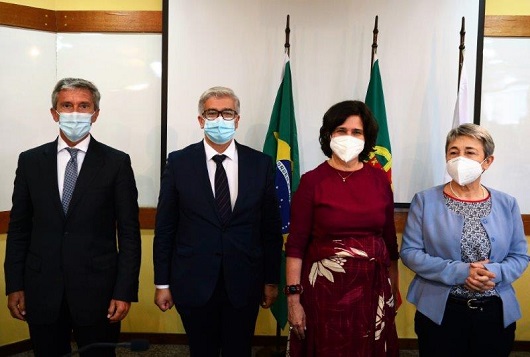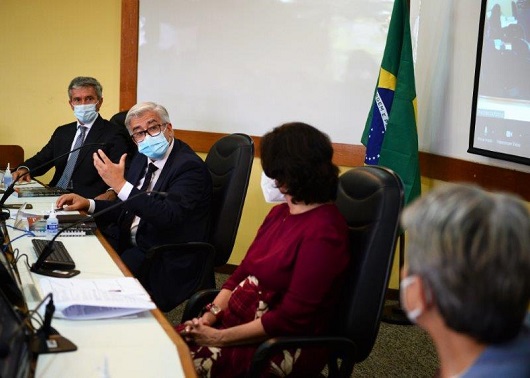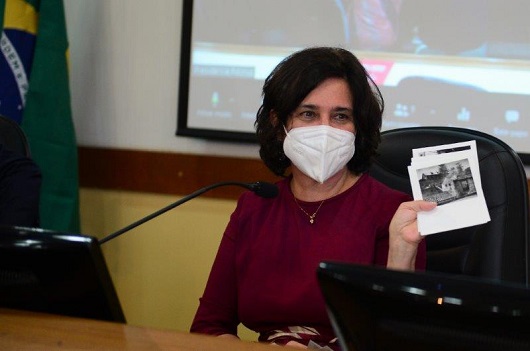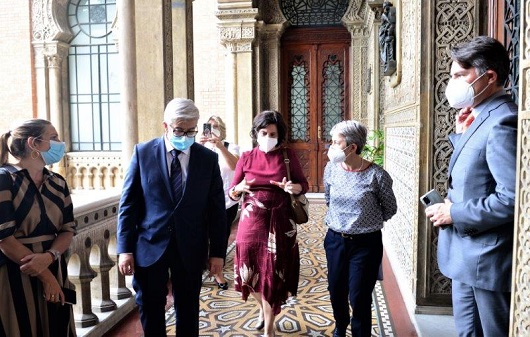With the Secretary’s visit, Fiocruz and Portugal celebrate a scientific cooperation
20/10/2021
Cristina Azevedo (Fiocruz News Agency)
A cooperation that dates back to the beginning of the last century and that has been renovated and expanded over the decades was celebrated last Thursday (October 14th), with the visit of Portugal’s assistant secretary of Health, António Lacerda Sales, to Fiocruz. Accompanied by the Secretary of State of the Portuguese Communities, Berta Nunes, and by ambassador Luís Faro Ramos, among other members of the delegation, Sales was received by president Nísia Trindade Lima at the International Auditorium of the Sergio Arouca National School of Public Health (ENSP/Fiocruz), where they emphasized the need for cooperation between countries and between scientific institutions in order to overcome the COVID-19 pandemic and its consequences.
The ambassador Luís Faro Ramos, assistant secretary António Lacerda Sales,Fiocruz president Nísia Trindade Lima and secretary Berta Nunes (Photos: Peter Ilicciev)
This was the first time that representatives of the Portuguese government in the areas of Health and International Relations made a simultaneous visit to another country. “Even before the pandemic, the Portuguese government had already placed health in the center of all policies. We need health in diplomacy, in the economy, in the social sector, in all areas. This is the only way to succeed in any project of a future”, says Sales.
Similar trajectories
At ENSP, Nísia made a presentation on the history of the cooperation between Fiocruz and Portuguese scientific institutions. She highlighted the similarities in the trajectories of the Foundation, created in 1900 as Federal Serotherapeutic Institute, and the National Health Institute Doutor Ricardo Jorge (INSA), created in 1899. The Institute of Hygiene and Tropical Medicine (IHMT) came soon after, in 1902. Today, these three institutions are advisory observers for the Community of Portuguese Language Countries (CPLP in the Portuguese acronym). “This initial cooperation continued, and various others with Portuguese university institutions were forged along the way”, said Lima.
The collaborations became even more active in this century, acquiring new dimensions, both bilateral and within the CPLP, such as in the Public Health Institutes Network (Rinsp-CPLP), in which the Foundation is secretary executive, and in the Ibero-American context. The Fiocruz president also highlighted other initiatives, such as the Luci Project, which involves the universities of Coimbra, Nova de Lisboa, and Paris 8, in a vision of development of healthy and sustainable territories; and the International Platform for Science, Technology, and Innovation in Health (Pictis), in collaboration with the University of Aveiro and which was the subject of a seminar of the Oswaldo Cruz Institute (IOC/Fiocruz) in September.
“We need to think on how to overcome this public health and humanitarian crisis, as it goes way beyond the impact of virus transmission. We need to learn from this dramatic experience that has already left a mark in the 21st century”, said Lima, emphasizing that joint work will be crucial for the “reconstruction of a world with more equity, justice, and citizenship”.
Describing Portugal as a fundamental partner, the Fiocruz president announced biannual seminars to discuss the advancement of the cooperation and the creation of a workgroup on the cooperation, coordinated by Mario Moreira, vice-president of Institutional Development and Management.
Lessons learned from Ricardo Jorge and Oswaldo Cruz

"We must keep learning from Ricardo Jorge and Oswaldo Cruz", said Sales
Ambassador Luís Faro Ramos emphasized the increased cooperation between Fiocruz and Portuguese scientific institutions in the past few years. He suggested the creation of a “health cluster” as well as the expansion of structural cooperation in all levels: bilateral, Ibero-American, CPLP, and also between Brazil and the European Union. “I was here seven months ago and much has been accomplished since then, with the signature of protocols, exchange of researchers and more”, he said. “We are on a good path, and I can only hope it continues”.
Lima presented the Portuguese delegation with a special edition of the History, Science, and Health - Manguinhos magazine, and received from Sales a set of postcards on the fight against the bubonic plague, a record of how this epidemic gave rise to INSA and to Portugal’s National Direction of Health “This is why we must keep learning from Ricardo Jorge and Oswaldo Cruz, people who made history”, said Sales.
Feeling he “feels like he’s back at home”, the secretary highlighted the partnerships with Aveiro and the Platform as examples of an internationalization strategy of the Foundation that includes Portugal. He also mentioned Mario Moreira’s visit for the development of a consortium with Portuguese companies and agencies with the goal of implanting a production structure for pharmaceutical products in the north of the country.
Secretary of State of the Portuguese Communities, Berta Nunes is also in charge of the joint work with institutions in Brazil. She highlights that cooperation is crucial in the fight against inequalities in both countries and in the rest of the world. Nunes also mentioned how COVID-19 affected people’s mobility as borders were closed, which had an impact on Portuguese communities. “Portugal has 10 million inhabitants, and there are more than 5 million Portuguese and Portuguese-speaking descendants all over the world, a million of which are in Brazil”, she estimated. “For us, the Portugal-Brazil cooperation is not just a matter of government, it is an issue for both our peoples, because our communities long for more collaboration and more exchanges”, she said. “Fiocruz is a great example, as it works with public health policies as well as with top-notch technologies. There are not many institutions with such rich and wide-ranging capacities in the world”, she completed.
Nísia and the postcards received from the Portuguese delegation
Fraternal work
Some members of Fiocruz talked about the cooperation between their institutions and Portugal, while others followed the meeting via Zoom. In the auditorium, with attendees sitting one seat apart from each other due to the COVID-19 protocols, Felix Rosenberg, executive secretary of RINSP-CPLP, said that since 2006 Brazil and Portugal have been transcendental in the creation of a model of international cooperation, the Strategic Plan of Cooperation in Health (Pecs-CPLP). “The joint work of Portugal and Brazil within the CPLP has been fraternal, in solidarity with people. We have made joint visits to Cabo Verde, East Timor, Angola... Always sharing horizontal and solidary cooperation”, he declared.
Mario Moreira mentioned that his trip to Portugal originally involved the founding of an association in the Oporto area, with Portuguese public agencies and private companies, to develop health products - an initiative that “completes our actuation in Portugal and follows on in the dimension of what we call Economic and Industrial Health Complex”. The trip ended up including a visit to traditional collaborators, such as the National Public Health School, and a conversation with the Ministry of Science and Technology, Manual Heitor. “Fiocruz has a large area of cooperation in Portugal, and this understanding is reciprocal. We have a history, but it needs to be worked, because the world has changed, we are currently in another concept of public health”, he said.
IOC Director Tânia de Araújo-Jorge highlighted that the idea of a platform, such as the International Platform for Science, Technology, and Innovation in Health, “is where we move on to another phase of the cooperation”. Araújo-Jorge organized the September seminar, attended by the Portuguese ambassador. She mentioned that “Our Pictis project portfolio represents everything both our countries can do best”, and shows that Fiocruz’s most ancient unit is “constantly undergoing renovations”.
Marco Menezes, ENSP director, mentioned decades of partnership between the school and Portuguese institutions, in fields ranging from environmental and clinical toxicology to literacy in health. In the field of environmental health, he highlighted the Luci initiative, “a free university of knowledge that articulates the territories of sustainable areas”. Menezes also emphasized the creation, within the CPLP, of the Public Health Schools Network (Rensp-CPLP). “Today we have actions with Mozambique and other African countries, that need to be amplified and brought to the CPLP agreement and to the schools' network”.
Annamaria D’Andrea Corbo, director of the Joaquim Venâncio Polytechnic School of Health (ESPJV), talked about the training of health technicians. Since 2004, the ESPJV is a Collaborating Center of the World Health Organization (WHO) for the education of technicians, and since 2005 it has occupied the executive secretariat of the International Network of Education of Health Technicians (Rets), with more than one hundred institutions from the Americas, Africa, and Europe. “In 2009, with the joint work of Fiocruz and IHMT, we helped with the creation of PECS. One of the results of this work was the organization of the CPLP Technical Schools Network, of which we are also executive secretariat. More recently, in 2021, we were also given the executive secretariat of the Ibero-American Network of Education of Health Technicians (Riets)”, said Corbo.
Director of the Institute of Scientific and Technological Communication and Information on Health (Icict/Fiocruz), Rodrigo Murtinho mentioned how the pandemic showed the importance of information and highlighted partnerships with Portuguese universities in this field. “For decades, they have organized and participated together in the conferences for open access to knowledge, which have generated Portuguese-Brazilian conferences about the subject in the past few years, such as the one that is taking place in Braga right now”, he commented.
Visit to the Castle
Jorge Mendonça, director of the Institute of Drug Technology – Farmanguinhos, mentioned collaboration projects with Portuguese universities, such as those of Nova Lisboa and Aveiro. “Having the opportunity to deepen liaisons with the goal of joint developments is a great factor of attraction between Farmanguinhos and Portuguese institutions. I’m sure they will yield good fruits for everyone”, he said.
The Portuguese delegation visited the Castle, Fiocruz's headquarters
Christopher Milewski, director of the Institute of Science and Technology in Biomodels (ICTB/Fiocruz), the Foundation’s most recent technical-scientific area, suggested the creation of a joint knowledge platform. “We can create different fields of common interest, of collaboration with Portugal and with other European institutions, not only regarding knowledge on animals, but also the development of alternative methods to the use of animals, so we can reduce their use in laboratories”, he said.
The Portuguese delegation also consisted of Luís Gaspar Silva, general consul of Portugal in Rio de Janeiro; Ana Carla Correia, chief of Coordination of International Relations for the General Direction of Health; Sandra Cardoso, chief of the Secretary’s Office of Health; Paulo Domingues, chief of the Secretary’s Office of the Portuguese Communities (SECP); Catarina Paiva, SECP assistant; Paulo Porto, Deputy of the Assembly of the Portuguese Republic; Maria da Luz Cabral, director of Lisbon’s Santa Casa de Misericórdia. After the event at ENSP, they went on to a visit to the Castle, which, as Nísia mentioned, was designed by Portuguese architect Luiz Moraes. Although it is currently undergoing renovations, it was possible to visit part of the ground level.
The event was also attended by Cristiani Machado, vice-president of Education, Information and Communication for Fiocruz; Valber Frutuoso, assistant of the Secretary’s Office of the president for Institutional Relations; Inês Fernandes, assistant for the Presidency; Ilka Vilardo, assistant of the Fiocruz Global Health Center (Cris/Fiocruz); and Anna Cristina Calçada Carvalho, coordinator for Institutional Cooperation of IOC/Fiocruz.


